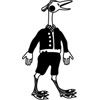the.bricoleur
Adept
  
Posts: 341
Reputation: 7.79
Rate the.bricoleur

making sense of change
 
 
|
 |
Turkey - Origin of English Language
« on: 2004-10-29 05:55:05 » |
 |
NZ study cracks origin of English language
01.12.2003
By ANGELA GREGORY
Auckland University researchers have stunned academics worldwide by tracing
the origins of the English language to Turkish farmers.
Using a novel approach to develop an Indo-European language tree, the
researchers say they have evidence that the roots of the English language go
back about 9000 years to Turkey.
Associate Professor Russell Gray and PhD student Quentin Atkinson published
their research in the British journal Nature.
Their findings on the long-debated origins of the language have quickly
spread.
The origin of the Indo-European language family has been the most
intensively studied problem of historical linguistics, but numerous genetic
studies have produced inconclusive results.
For almost two centuries linguists and archaeologists debated two theories
on the origins of the language family, whose members ranged from Greek and
Hindi to German and English.
It was thought the language was spread either by rampaging Kurgan horsemen
who swept down into Europe and the Near East from the steppes of Russia 6000
years ago, or by farmers from Anatolia (modern Turkey) who had tilled their
way westwards several millenniums earlier.
Professor Gray, an evolutionary biologist in the university's psychology
department, said yesterday that his results showed only the latter theory
could be correct.
He had used methods derived from evolutionary biology to study the problem
for the past five years.
He accepted his approach to build an evolutionary tree of the Indo-European
languages was controversial and subject to criticism.
But Professor Gray said he thought it was a valid technique that had clearly
shown the origins of the English language went back further than had been
thought, excluding the Kurgan horsemen theory.
It appeared that Indo-European languages had expanded with the spread of
agriculture from Anatolia 7800 to 9800 years ago.
Professor Gray and Mr Atkinson had analysed thousands of words from 87
languages to find out when the various branches of the Indo-European family
tree started diverging.
"We looked at words from different languages that were clearly related and
grouped them in sets."
Professor Gray said a simple example was that five was cinq in French and
cinque in Italian.
"We built matrices of all our information, gleaned from the internet and
every obscure etymological dictionary we could find."
The researchers then used sophisticated computer programs to do the analysis
and build language trees.
The length of the resulting branches and their various offshoots showed when
each language diverged from its predecessors and developed a separate
identity.
Professor Gray said Hittite (an extinct Anatolian language) was the first
major language group to branch from the Indo-European trunk.
Over subsequent millenniums the same trunk sprouted Tocharian, Armenian,
Greek, Albanian, Iranian, Indic, Slavic, Baltic, Germanic, French/Iberian,
Italic and Celtic language groups.
A Marsden Fund grant from the Government and a James Cook Fellowship from
the Royal Society of New Zealand helped to pay for the research, which
included the equivalent of three solid years of computer time.
http://www.nzherald.co.nz/storydisplay.cfm?storyID=3536968&thesection=news&thesubsection=general
"It is a truism, of course, that in "democratic" states the populace
must be encouraged to imagine that it makes important decisions
by voting, and must therefore be controlled by suitable propaganda,
which implants ideas to which the voters respond automatically as
trained animals respond to words of command in a circus, thus
leaving to the masses only a factitious choice between Tweedledum
and Tweedledee on the basis of their preference for a certain kind
of oratory, a hair-style, or a particular facial expression." -- Dr. R.P.
Oliver
" THE TRUTH IS HATE TO THOSE WHO HATE THE TRUTH." -- Anon.
|




